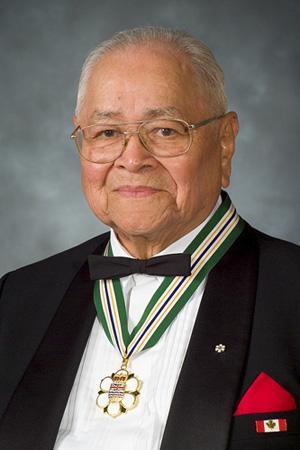Frank Arthur Calder (Frank Arthur Calder)

Frank Arthur Calder, OC OBC (August 3, 1915 – November 4, 2006) was a Nisga’a politician in Canada, the first First Nations person to be elected to any legislature in Canada. Born in Nass Harbour, British Columbia, Calder was the first Indian to graduate from the Anglican Theological College of the University of British Columbia. Mr. Calder was an hereditary chief of the House of Wisinxbiltkw from the Killerwhale Tribe. He died November 4, 2006 at an assisted-living home in Victoria from the effects of cancer and recent abdominal surgery. In the 1949 British Columbia election, Calder was elected to the Legislative Assembly of British Columbia. He was elected in the riding of Atlin where he continued to serve until 1979. Calder represented BC’s Co-operative Commonwealth Federation (which later became the New Democratic Party of British Columbia). Frank Arthur Calder was appointed cabinet member in Dave Barrett’s government in 1972 and became BC’s first aboriginal cabinet minister. In 1973, police found him in a consensual situation involving a female companion, alcohol and a car parked in an intersection. He was arrested but not charged and was fired from cabinet. In 1974 he was defeated by Joseph Gosnell in his bid to be re-elected as president of the Nisga’a Tribal Council.
In 1975, Frank Arthur Calder crossed the floor to join the Social Credit Party of British Columbia and was re-elected. In 1979, however, Calder lost his seat to the NDP candidate, Al Passarell, by a single vote. Calder and his wife had both neglected to vote. Calder is famous for the court case titled “Calder vs. Attorney General of British Columbia”, which was argued by Thomas Berger. By appealing the case all the way to the Supreme Court of Canada, Calder established that Aboriginal title exists in modern Canadian law. This decision had national and international reverberations. In addition, it was the basis of BC’s Nisga’a treaty. Before the Calder Case, there was no clear process for negotiating Canadian land claim settlements. Calder clarified which lands were negotiable (40% of Canada’s land mass) and which were not. After the case, Canada developed a land claim policy to guide negotiations. He continued to fight for Nisga’a’s treaty rights as recently as 2000. Calder founded the Nisga’a Tribal Council, the first tribal council established in B.C. Calder was its president for 20 years until 1974.
Born
- August, 03, 1915
- Canada
- Nass Harbour, British Columbia
Died
- November, 04, 2006
- Canada
- Victoria, British Columbia
Cause of Death
- cancer

